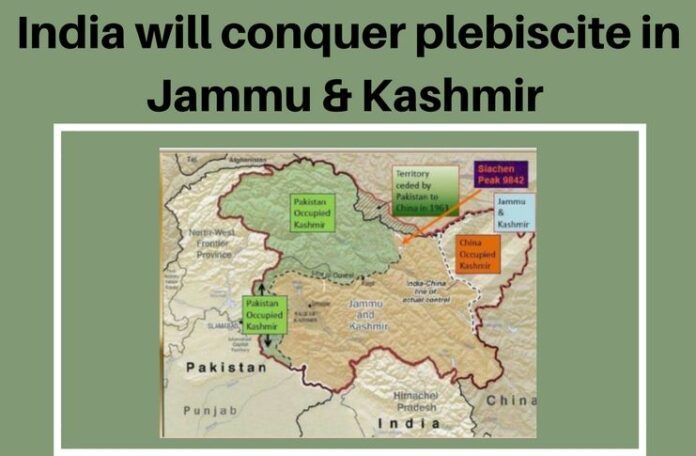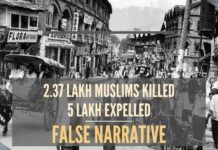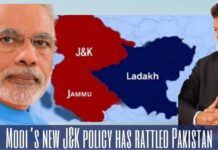
Jammu & Kashmir-forever priority on pakistani agenda
[dropcap color=”#008040″ boxed=”yes” boxed_radius=”8px” class=”” id=””]O[/dropcap]n National Day (March 23), Pakistan President Mamnoon Hussain said at Islamabad that “India’s irresponsible behaviour has been jeopardising the peace of the region” and also urged the international community to play its role for the resolution of Kashmir dispute while reiterating the political, diplomatic and moral support to “Kashmiri brothers”.
“We are ready for dialogue with India and want to resolve the issue of incomplete agenda of the division of the subcontinent, in accordance with the UN resolutions on Kashmir,” he also said (Dawn. Com, Mar 23).
In New Delhi, Pakistan High Commissioner to India Abdul Basit also aired almost similar provocative views. He virtually warned India that Pakistan is a “nuclear power” and it would be in the interest of both the nations – India and Pakistan – to resolve the so-called Kashmir issue. The operative part of his speech made in New Delhi read like this: “We hope that we will be able to solve our differences and issues, especially the Kashmir issue. We will continue to extend support to the Kashmiri pro-freedom leadership, as their struggle is for the freedom. Struggle for freedom of Kashmiri people will one day succeed by the grace of God. Issue of Jammu & Kashmir must be resolved as per aspirations of Kashmiris,” he was quoted as saying (Greater Kashmir, Mar 23, Latest News).
Those responsible for the Kargil misadventure in Pakistan seem to have learned no lesson. This is evident from their insistence on the out-moded plebiscite to determine the Kashmiri’s choice between India and Pakistan and their reassertion of moral, political and diplomatic support to Mujahideens.
[dropcap color=”#008040″ boxed=”yes” boxed_radius=”8px” class=”” id=””]A[/dropcap]ll these means two things. One, that Kashmir would forever remain on top of the Pakistani agenda. The other is that, those controlling the political and military establishments in Pakistan believe that, what Pakistan has failed to accomplish by full-scale wars of 1947-1948, 1965 and 1971 and the ongoing low-intensity proxy war can be achieved through a plebiscite. Even if India conceded the right to self-determination in the distinct regions of Jammu, Kashmir and Ladakh, Pakistan would emerge out of this exercise minus everything.
The Jammu province, which occupied 18.92 per cent of the State’s land area and houses almost half the State’s population, will vote overwhelmingly in favour of India. There are several factors in the Jammu province which work in favour of India. First, the Jammu Province is predominantly Hindu (over 70 per cent). Second, it houses over 10 lakh ethnically different Gujjar and Bakerwal Muslims, whose support for the Indian action all through has been unflinching. The memories of Pakistani barbarism in 1947-1948, 1965 and 1971 are too fresh to be forgotten.
Besides, a substantial chunk of the Jammu region’s population consists of those who migrated from Pakistan and Pakistan-occupied-Jammu & Kashmir and the Kashmir Valley itself to escape their liquidation in 1947 and 1990. They are almost two million. Then, there were some who migrated from Jammu to Pakistan in 1947 owing to their religious affinity, but returned following shabby treatment in that country.
Four, the plight of the Mohajirs, the Shias, the Ahmediyas and numerous other religious and ethnic minorities in Pakistan always serves as a deterrent.
[dropcap color=”#008040″ boxed=”yes” boxed_radius=”8px” class=”” id=””]L[/dropcap]adakh, which constitutes 69.60 per cent of the State’s land area and has an overwhelming Shia-dominated Kargil district, is devoid of any fissiparous tendency. The Shias in the Trans-Himalayan district are anti-Pakistan and intensely pro-India and pro-Indian Army. The Pakistani excesses and certain concerted moves on the part of Jamait-ul-Ulma-e-Islam and other radical outfits in Pakistan to get Shias declared as non-Muslims always linger in their mind. They consistently say that the residents of Kargil have been victims of Pakistan’s torment and that “India is a better country”.
The predominantly Buddhist-majority Leh district, everyone knows, is pro-India. The people there have been struggling since 1949 to obtain a Union Territory status. Their argument has been that the UT status is the only political instrument that can end the Valley’s domination over Ladakh, empower its inhabitants, protect and advance further its distinct identity and personality. The most significant aspect of the Leh district’s political scene is remarkable unity among the Buddhists, the Muslims (all Shiite Muslims) and Christians.
The small Sunni-dominated Kashmir Valley, the real trouble-spot, could produce a mixed result. The Kashmiri Muslims are not homogeneous. They are vertically divided into five groups demanding greater autonomy, self-rule, merger with Pakistan, complete independence from India and Pakistan and the State’s total merger with India. If confronted with a choice between India and Pakistan, a vast majority of them would opt for the former. There should be no doubt about it.
[dropcap color=”#008040″ boxed=”yes” boxed_radius=”8px” class=”” id=””]T[/dropcap]he demands of the over four-lakh internally-displaced Kashmiri Hindus include a separate homeland in the Valley invested with UT status or a security zone within Kashmir and reservation for the Kashmiri Hindu community in education and jobs. They are the orginal inhabitants of Kashmir and, hence, the most important factor in the State’s political situation.
It is very important to underline that Pakistan has handed over 5000 sq km area to China, which also includes the highly strategic Karakoram Highway. The Pakistani suggestion, if accepted, would automatically mean involvement of China in the “dispute”. A very large tract of land in PoJK, called the Northern Territories comprising Gilgit-Baltistan, Hunza, Yasin, Nagar, Ishkoman, Astore, Bunzi, Chitral, and so on has been surreptitiously integrated into Pakistan and is now under the direct control of the federal government. Reports are there to the effect that Islamabad has resolved to merge it completely with Pakistan and declare it as its fifth province. The fact of the matter is that Pakistan has violated the UN resolutions on Jammu & Kashmir by ceding parts of the Jammu & Kashmir territories to Beijing and establishing its direct rule in Gilgit-Baltistan.
[dropcap color=”#008040″ boxed=”yes” boxed_radius=”8px” class=”” id=””]I[/dropcap]slamabad would do well to consider these important factors, including the three conditions the UN resolution of August 13, 1948 have imposed: Withdrawal of all Pakistani troops from PoJK and its reoccupation by the Indian Army before a plebiscite and the plebiscite has to be in the entire State as it existed on August 15, 1947 and not province or district-wise. The Pakistani rulers must admit that their Kashmir policy has been short-sighted and provocative.
Note:
1. Text in Blue points to additional data on the topic.
2. The views expressed here are those of the author and do not necessarily represent or reflect the views of PGurus.
- ‘Kashmir My core constituency’: Revisiting July 12, 2003 to understand politics, Omar Abdullah-style - March 15, 2024
- Total deviation from traditional approach: Seven takeaways from PM Modi’s March 7 Srinagar visit - March 9, 2024
- Status of political parties: Why is further J&K reorganization imperative? - March 1, 2024











No way to agree for a plebiscite by India even if victory is assured.
The primary condition is for Pak to vacate the area and compensate India for Kashmir upkeep/luxury/anti India struggles and damages plus to the KP community for their banishment from their own home/land.
In the meantime more and more ‘surgical strikes’ is the answer to rein in a recalcitrant/hostile Pakistan.
By agreeing to plebiscite, we accept that there is dispute.Instead we should divide J & K in to three separate states, Jammu,Ladakh and Kashmir.Then spend resources to develop Jammu and Ladakh, create sanitized zone within Kashmir for Kashmiri Hindus and spend resources there.Those seeking Azadi should be left to fend for themselves in front of our security forces.If international community is allowing Pakistan to cede disputed territory to China, what prevents us from dishonouring Indus Water Treaty? And what should prevent us from recognising a govt in exile for independent Balochistan?
U make much sense, even the prof Mahajan’s suggestions can be a game changer & can catch Pakistanis pants down. Modi should risk this infamous idea which is totally workable for India & Kashmiris.